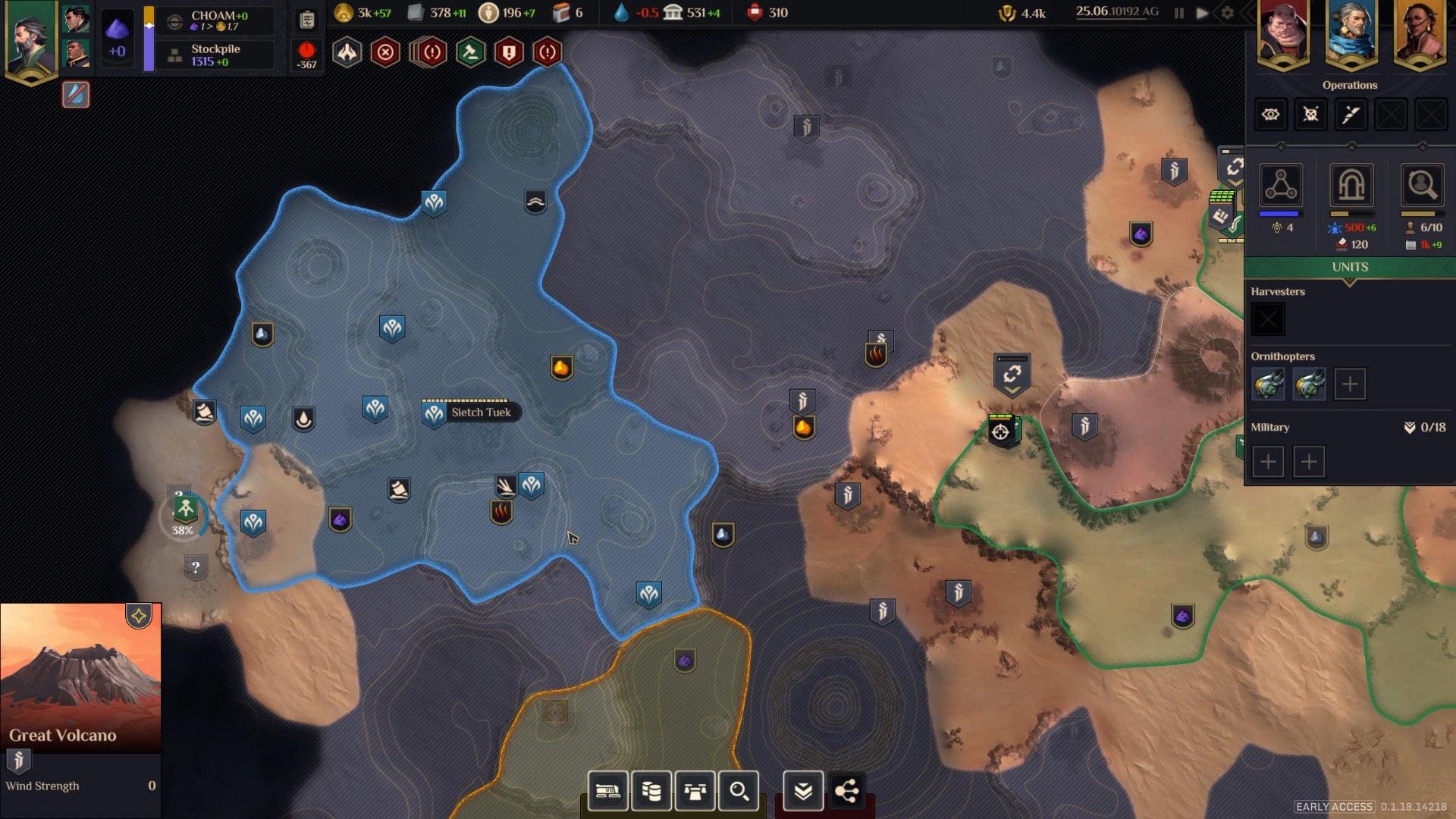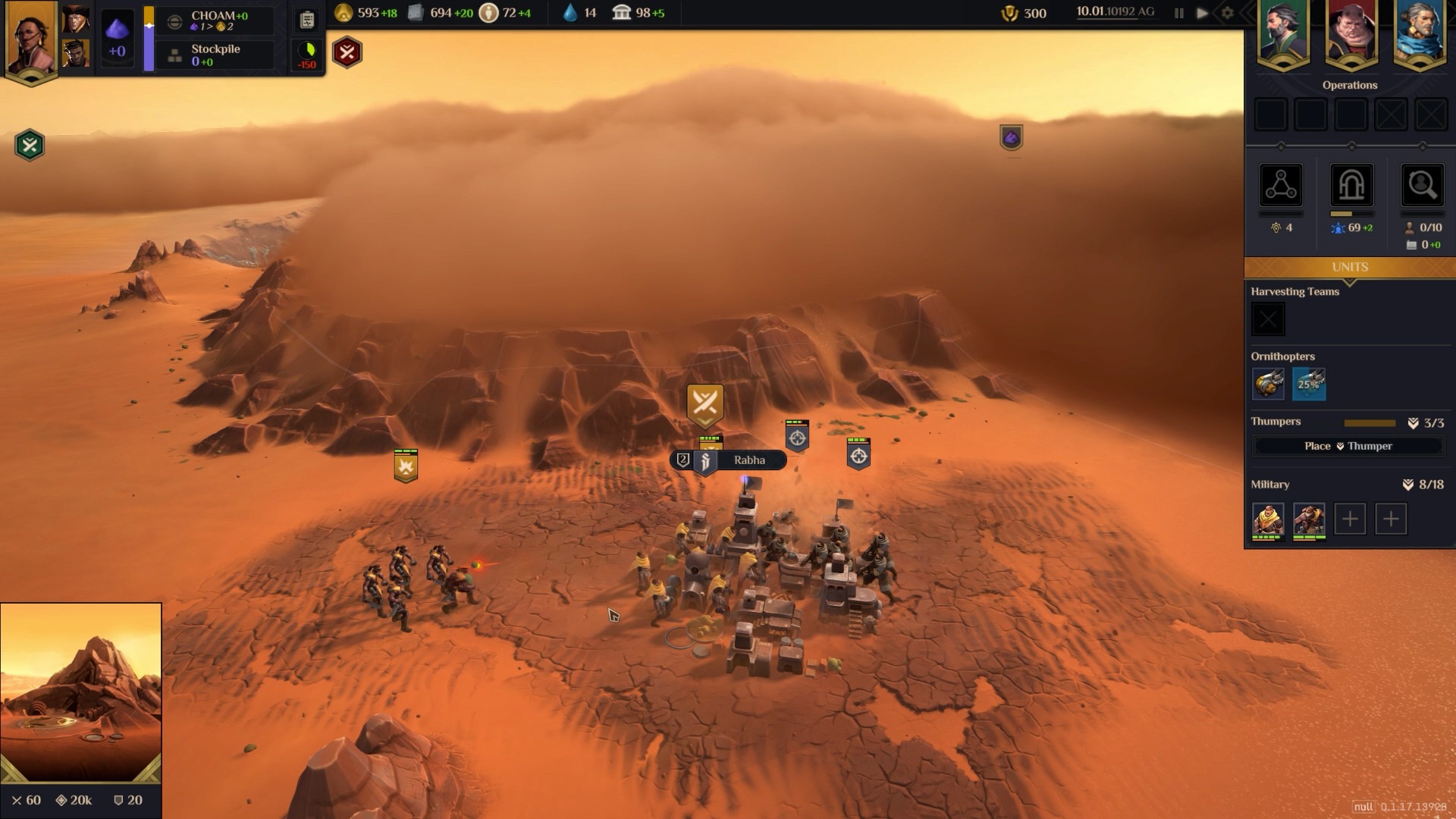Developer: Shiro Games
Publisher: Funcom, Shiro Games
Platform: PC
Code Received.
The season of Dune is certainly upon us. With the big budget film adaption taking home several Academy Awards, we also have Dune: Spice Wars to wet our whistle. Brought to us by Shiro Games, who previously worked on Northgard, Dune: Spice Wars is a 4x RTS game that aims to bring the world of Dune to life on a grand scale. The game just launched into early access on Steam, but even in it’s current state it has the deep roots of an ambitious strategy game. Dune: Spice Wars manages to work the unique environment, political espionage, and shrewd commerce of Dune into an RTS framework that’s easy to pick up and play.

As of this writing you can play as one of four factions: Atreides, Harkonnen, Smugglers, and Fremen. Each faction has their own set of perks and play styles, in line with their motivations in the Dune fiction. For instance, Atreides expand and capture new territory peacefully, while Harkonnen use their military might. The differences between the factions extend to resource gathering as well. Where Fremen harvest spice in harmony with the planet, and don’t have to worry about sandworm attacks, Atreides and Harkonnen use giant machines that disrupt the ecosystem, sometimes attracting sandworms than can devour their collectors in a single bite. It’s quite a bit to dig into at first, but eventually you can identify the strengths and weaknesses of each faction by how differently they play. The game also has a decent tutorial that teaches you the ropes, and each match starts with simple objectives to get you started.
Just like in the Dune fiction, Dune: Spice Wars is full of espionage, back room deals, shrewd diplomacy, and plenty of other shady business. You will be acquiring agents which you can use to infiltrate rival factions or work the local communities and guilds. This system is literally called Espionage and it primarily works to boost your various incomes. Over time you will unlock the ability to perform covert operations that reward you with one-time use abilities like revealing a rival faction’s units or boosting your attack power. The further you go down the Espionage path the more significant the abilities become, allowing you to really turn the tide of a conflict if used properly.

If Espionage hides what lies in the shadows, then the Landsraad is where you will be making your political statements in the broad daylight of Arrakis. The Landsraad Council allows all the factions to openly vote on resolutions that may boost or hinder other factions, or the whole region. Many of these resolutions are simple and superficial, lasting only a short time. However, there a few a that can be a real thorn in your side if you’re on the receiving end. The long-game here is to slowly build influence by getting the resolutions you want consistently passed, and unlocking Charters that really impact the game’s momentum. In fact, the ultimate goal here is to become the governor of Arrakis. As the Landsraad is a tool of the Empire, the Fremen and Smugglers do not have as much influence, however, their weakness here is countered with bonuses in other areas.
I do wish there a little more direct faction diplomacy and communication than there is right now in the game. The Landstraad and Espionage systems are big parts of the game, however, they don’t currently allow for interpersonal relationships to form between different factions. I’d like the opportunity to work out deals with other factions to get resolutions I want passed, then turn around and stab them in the back once I ascend to power… or not do that and rule the galaxy peacefully. There’s also a heavy focus on military conquest in the game. Besides Atreides, all the other factions capture new settlements through force, and I’d like to see more options here. Perhaps allowing settlements to be traded between factions. The combat lacks tactical depth at the moment, so the less you are forced to engage with it the better.

There’s also a fairly straight forward tech tree broken up into four categories. The technologies allow you to build more advanced buildings, which naturally bring more resources or provide access to different units. It’s important to keep an eye on where you are focusing your research because it will take some time to fully unlock everything. Essentially, you’ll want to focus on what you need to in the sort term, then refocus your attention on whatever play style you’re going for.
A 4x RTS may sound like an odd mix. The juggernaut that is the Civilization series has taught us that 4x games are typically turn-based, with less focus on combat and more on.. civilized victory conditions. With Dune: Spice Wars, Shiro Games has leveraged the slow, methodical pace of a turn-based 4x strategy game with the quick reactive gameplay of an RTS game. Matches start out slow, but quickly heat up; requiring micromanagement and snap decisions as your borders are constantly threatened. The flow of the game immediately reminded me of Stellaris, which is a fantastic blend of real-time exploration and combat, mixed with colony building, galactic diplomacy, and economic expansion. Even the interface reminds me of Stellaris. Time will tell how all the game’s systems will pan out, but with these influences, a supremely rich lore to extract from, and an already solid foundation, Dune: Spice Wars seems primed to keep the spice flowing.








